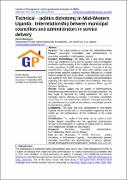Technical – politics dichotomy in Mid-Western Uganda: Interrelationship between municipal councillors and administrators in service delivery
Abstract
Purpose: This study aimed to analyse the interrelationships between municipal councillors and administrators in municipal councils in mid-western Uganda. Research Methodology: The study took a case study design, which was adopted by seeing that the problem under investigation involved a rigorous inquiry of the multiple elements that contribute to the uniqueness of public service delivery. A sample of 48 was realised from a population of 55; these were selected using the proportionate stratified sampling technique followed by a simple random sample for each of the strata. A questionnaire was used to seek opinions from both municipal councillors and administrators regarding interrelationships and public service delivery. Data were analysed using descriptive statistics to generate Means (μ) and Standard Deviations.
Results: Results suggest that the degree of interrelationship between the two stakeholders is poor for municipal councillors, yet they ought to represent the voting population; the level of municipal service delivery is average a non-linear association concerning the interrelationships between municipal councillors and administrators on public service delivery in municipal councils in mid-western Uganda
Limitations: This study was only concentrated in mid-western Uganda, yet the country has 41 municipalities suggesting that the results are not representative of the conditions in the whole country.
Contribution: The results of this study can be useful to both locally elected councillors and the appointed administrators serving at Municipalities in Uganda by aiding them to improve work-relationship for better service delivery.
Collections
- Research Articles [139]

